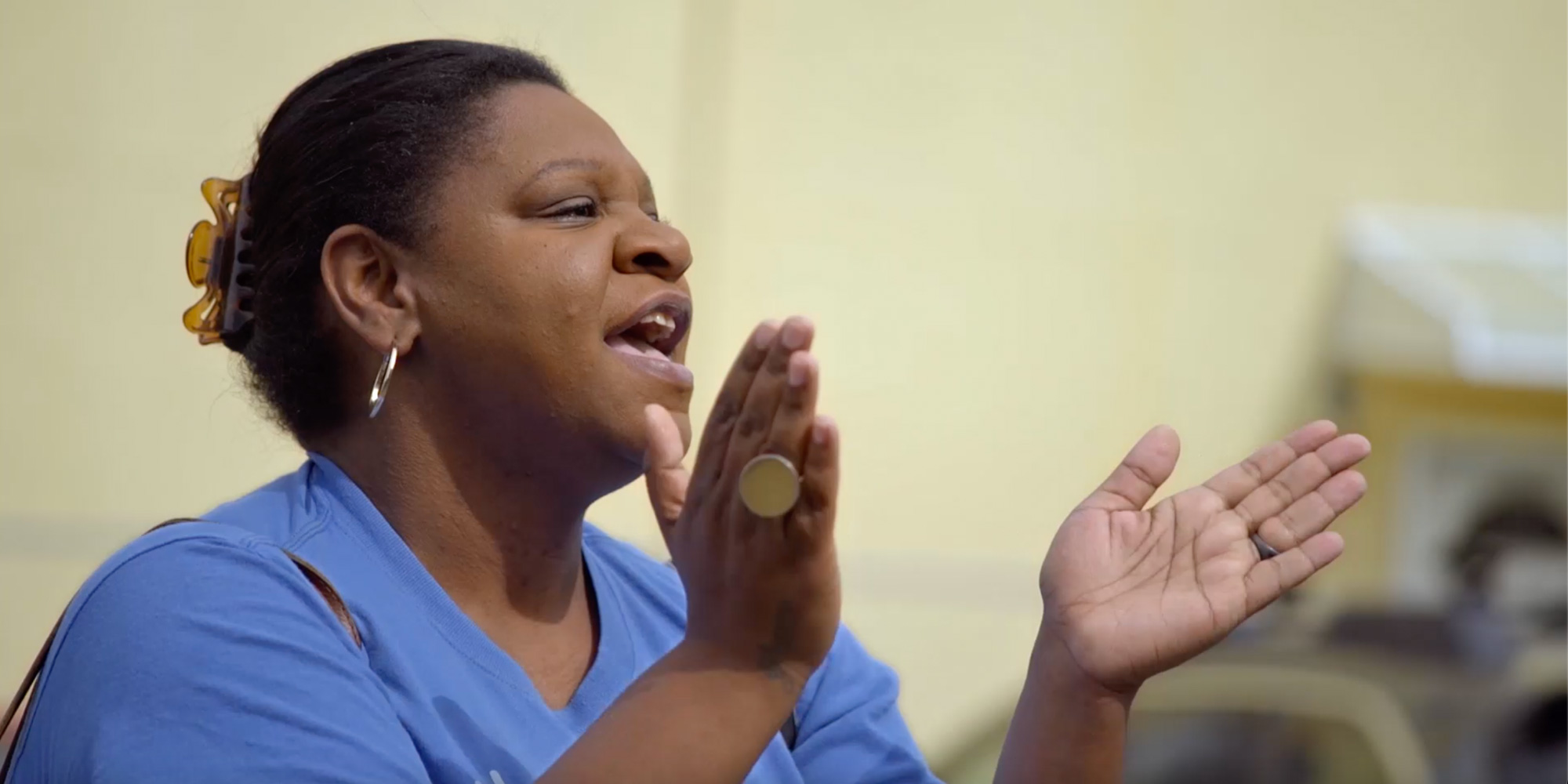“Clarissa’s Battle” tells the story of a 10-year campaign for a tax increase to subsidize child care in Alameda County, Cal. In the first of two battles in the documentary film, Parent Voices Oakland comes up a half-percent short of the votes needed to pass a new sales tax measure. The second battle, over a Citizen’s Initiative known as Measure C, passes early in 2020, but the pandemic hits before the vote can be certified. The largest ballot initiative of its kind has ramifications not just for families and children in Alameda County, which includes the city of Oakland. It signals a promising direction for early child care advocates across the nation.
I spoke to the courageous women on both sides of the camera. Clarissa Doutherd and Tamara Perkins were both solo parents when they met at Bananas, an Oakland nonprofit that connects parents and families with child care providers.
Filmmaker Perkins had visited because she had been laid off from her job—thus losing her health insurance—when she was nine months pregnant. “I had never accessed any social services until I was suddenly thrown off the cliff and had to figure out health care,” she says. “I was in this very raw state of trying to understand how this had happened to me.”
She adds, “The stories that I told have been really tied to my own life experience.” Her other projects include Life After Life and Rebound, which both deal with the consequences of mass incarceration.
At Bananas, Perkins and Doutherd commiserated and compared notes about the obstacles for single mothers trying to obtain benefits. “In Europe,” Perkins says, “All of this support is just expected. And here we are shaming the parents who need these services and subsidies to survive.”
👉 “It’s like a nightmare you never wake up from’: Bay Area parents wait years for subsidized daycare” (Mercury News, Nov. 29, 2019)
For Doutherd, the story was all too familiar. She and her two siblings grew up in Sacramento with a single mother who relied on public benefits, and she still remembers the stigma and the challenges. Much of the time, her grandparents, who had escaped extreme racial violence in the deep South by joining the military, provided the child care. “They instilled in us our sense of history and purpose. I also learned how to address poverty and racism and gender injustice through humor and through art.”
Doutherd had first come to Bananas for a child care subsidy and was waiting to meet her case manager when an organizer from Parent Voices Oakland, which is located in the same building, approached. “She asked me what I thought about the child care system,” Doutherd recalls. “How is it working for me as a parent? And that was really the first time anyone had asked me a question about what I thought or felt about any public service.” She volunteered with the organization for two years before joining the staff and now serves as executive director.
What originally politicized Doutherd, she explains, was “someone else making decisions about the health and well-being of my son. I was enraged by the fact that I didn’t know about services that were actually life preserving for my son and me. All I wanted to do was make sure that we were stable, that we had housing, that we had access to food, that our most basic needs were met.”
Doutherd discovered a network of what she calls in the movie “bad-ass, beautiful, fierce mothers”—including one named Tara, who took care of her son when he was sick and had no one else to watch him. “These women are really holding up society and not acknowledged or compensated for this labor. They do so much more than just babysit.” Parent Voices Oakland aims to build and nurture this community as well as organizing for policy reform.
👉 Clarissa’s Battle at the Human Rights Watch Film Festival
The film captures Doutherd’s balancing act as an organizer, recognizing that while her experience of homelessness when she first had her son was a trauma that qualified her to speak on the issue, she had to build power in order to persuade voters and elected officials. She pushes herself through exhaustion and a diagnosis of high blood pressure, knocking on doors and speaking to organized labor and other stakeholders across the county.
Doutherd’s son Xavier steals the show nearly every time he’s on camera. We see him making calls for Parent Voices and interrogating his mother about her work. “He got pretty used to the cameras, but mostly he got used to me campaigning,” Doutherd says.
Clarissa’s Battle ends on a cautious high note, and though a well-funded anti-tax group has challenged the measure in court, Doutherd expects her side to prevail. Meanwhile, Parent Voices continue to organize. “As long as child development centers attached to schools are closing,” Doutherd says, “as long as more providers than ever are having to close their doors because they can’t pay rent, we have to ramp up our organizing to protect public institutions and the social safety net. We still have to fight very hard.”

Mark Swartz
Mark Swartz writes about efforts to improve early care and education as well as developments in the U.S. care economy. He lives in Maryland.



